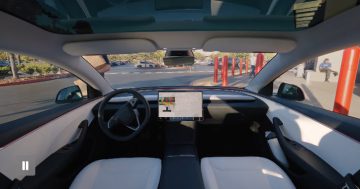Dan Newman* says a new study shows even if we don’t have one ourselves, we want driverless cars to be agreeable, conscientious and stable.
 Researchers set out to examine how the degree to which the vehicle and the rider seemed to share certain ‘personality’ traits influenced someone’s perception of safety of an autonomous vehicle.
Researchers set out to examine how the degree to which the vehicle and the rider seemed to share certain ‘personality’ traits influenced someone’s perception of safety of an autonomous vehicle.
“We wanted to answer the question: If we want to encourage people to use autonomous vehicles, how can we design the vehicles’ perceived personalities, or driving styles, so that drivers are more willing to adopt them?” says Lionel Robert, Associate Professor at the School of Information and core faculty at the University of Michigan Robotics Institute.
“It’s all about perception,” says X. Jessie Yang, Assistant Professor of Industrial and Operations Engineering.
“Objectively, autonomous vehicles could have very reliable performance, but if the human does not perceive them as safe, then they will not use them.”
‘The big five’ personality traits
The team focused on a set of personality traits used in social science, called ‘the Big Five’:
- Extroversion, or being sociable.
- Agreeableness, or being considerate.
- Conscientiousness, or having self-control.
- Emotional stability, or being well-adjusted.
- Openness to experience, or tolerating new ideas.
In the past, studies have found conflicting results on personality’s role in human-robot interaction.
In some studies, when a human and robot shared personality traits, it led to positive interactions.
In others, researchers saw positive interactions when a human and robot had dissimilar personalities or it depended on the context of the situation.
In an effort to shed new light on the topic, the researchers surveyed more than 440 drivers to determine how high or low they scored on each personality trait.
Then, participants watched videos from the front seat point-of-view of an automated vehicle driving as the vehicle varied from normal to aggressive driving and the weather varied from sunny to snowy.
Afterward, participants rated the vehicle’s ‘personality traits’ as well as how safe they felt in each situation.
The team found similar mixed results as previous studies: both similar personalities and divergent personalities improved the human-robot interaction.
But they were able to differentiate the data based on each trait.
Specifically, for the traits of agreeableness, conscientiousness, and emotional stability, riders felt safest when both they and the vehicle scored highly in each trait.
Riders who scored lower than average in these three traits nevertheless seemed to prefer a car that exhibited them.
Depending on the trait and the rider’s own personality, riders reported safety scores between 8.9 per cent and 13.8 per cent higher, on a five-point scale, if they believed the car to possess one of these traits than if it lacked it.
Cars with customised personalities
Riders felt the least safe when they scored highly in agreeableness, conscientiousness, and emotional stability, but the car scored lower.
The traits of extroversion and openness to experience had no impact on feelings of safety.
“The takeaway is that we want to design the autonomous vehicle to be agreeable, conscientious, and emotionally stable to increase perceived safety,” Yang says.
Beyond a single automated vehicle personality for all drivers, Robert envisions a future with customised personalities.
“Imagine the moment you get into an autonomous ridesharing vehicle, it pings your cell phone to update its driving style, voice and the way it interacts with you,” he says.
The researchers presented a paper outlining the research at the Association for the Advancement of Artificial Intelligence Fall Symposium on AI and Human Robot Interaction.
* Dan Newman is the Robotics Institute Communications Specialist at the University of Michigan.
This article first appeared at www.futurity.org






